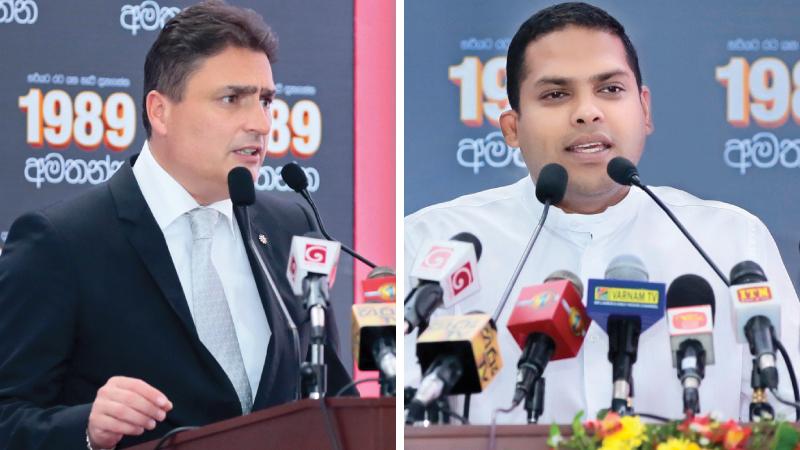
The Ministry of Telecommunication, Foreign Employment and Sports, has taken the initiative to facilitate low-skilled migrant workers efforts to make an informed decision on safe labour migration, through a national media campaign on the subject. The launch took place in Colombo last week.
“This is the need of the hour as there are controversial stories regarding migrant workers. At times, they are clueless as to what decisions they should take, and this initiative will support them to be aware of the environment they have to work in,” Minister of Telecommunication, Foreign Employment and Sports, Harin Fernando said.
The campaign is being implemented in collaboration with the Sri Lanka Bureau of Foreign Employment and supported by the Embassy of Switzerland in Sri Lanka. It aims to encourage citizens to make informed decisions and follow correct procedures for foreign employment by seeking proper guidance through reliable sources, the 1989 hotline, the SLBFE offices and Development Officers of the Department of Foreign Employment, based at every Divisional Secretariat and District Secretariat office.
“According to the controversial stories we’ve been hearing, they come down to effective communication to all our citizens to let them know which route to take in their journey towards migration.
“Another significant aspect is the varying laws of each county. The SLBFE has been doing a fantastic job but it’s a job that does not receive much praise. In the 13 countries we represent at present, we have our foreign employment offices and safe houses, to cater to the needs of migrant workers. Due to the lack of awareness, the people do not know whom to contact when it comes to matters of migration.
“Due to this lack of awareness, many people do not register themselves at the SLFBE, thus when an incident occurs, it becomes quite a challenge for the Bureau to help them and bring them back to Sri Lanka. I believe that this is the ideal platform for such a campaign,” the Minister said.
Secretary to the Ministry of Telecommunication, Foreign Employment and Sport, W.A. Chulananda Perera said there are three million Sri Lankan migrants who account for 10 percent of the population. However, remittances of foreign earnings from 2016 recorded a drop along with a drop in the number of workers facilitated by the agencies. The main drawback with regard to Sri Lankan migrant workers is the low skills factor.
The lack of access to reliable information for migrant workers and their families has been identified as a major problem that prevents Sri Lankans from making informed decisions when it comes to foreign employment.
The absence of easily accessible and reliable sources of information, which could promote better decision-making on migration for employment, causes a great deal of personal and social problems for workers and their families.
Many citizens, especially in the low-skilled category, choose to migrate without due consideration of its adverse implications, for the sake of personal and family interests. This often leaves them vulnerable to exploitation of their rights and those of their families, he said.
The campaign will raise awareness about getting the correct information that will guide prospective migrant workers. It also emphasises the necessity of registering with the SLBFE prior to their departure. In addition, the sources provide advice and facilities to help them build a secure and successful future in the country of their choice, such as information on vocational skills. Skills and qualifications will improve job prospects, income earning potential, working conditions and long-term investment plans.
Nearly three million Sri Lankans work overseas, representing around 10 per cent of the population. Most of the migrant workers are low-skilled construction and domestic workers in the Gulf countries, who are particularly vulnerable to exploitation and abuse.
Foreign remittances, primarily from migrant workers, continue to be the largest source of foreign exchange earnings for Sri Lanka, contributing 8.5 per cent to the country’s GDP.
By initiating a national level media campaign, the Ministry of Telecommunication, Foreign Employment and Sports, the Sri Lanka Bureau of Foreign Employment and the Embassy of Switzerland in Sri Lanka hope to mitigate situations where misinformed Sri Lankan citizens find themselves in unfortunate circumstances in foreign lands.
“Labour migration has evolved into a very important topic in world politics. A vast majority of the people migrate for better employment, education or other opportunities, for the betterment of their lives and the lives of their families,” Ambassador of Switzerland to Sri Lanka, Hanspeter Mock said.
“Migration not only benefits the person and his/her family but, also the country they come from and the country they are migrating to.
However, while labour migration is highly significant to a country’s economy and to the standard of living of many families, it has become increasingly evident that the difference between making migration work and being exploited often comes down to making informed decisions.
“The Safe Labour Migration media campaign seeks to reach out to all Sri Lankans across the island, to encourage and persuade them to think twice before migrating for employment and to ask all the important questions pertaining to skills, employment opportunities and the consequences for the potential migrant and their family. Switzerland is one of the front-runners in migration development at the global level.
“Our commitment within the system of the United Nations, shows this.
Switzerland supports and encourages the stakeholders of the countries of origin and destination countries to collaborate to improve the conditions of labour migrants and their families, because it is our understanding that both have a shared responsibility towards migrant workers,” the Ambassador said.
